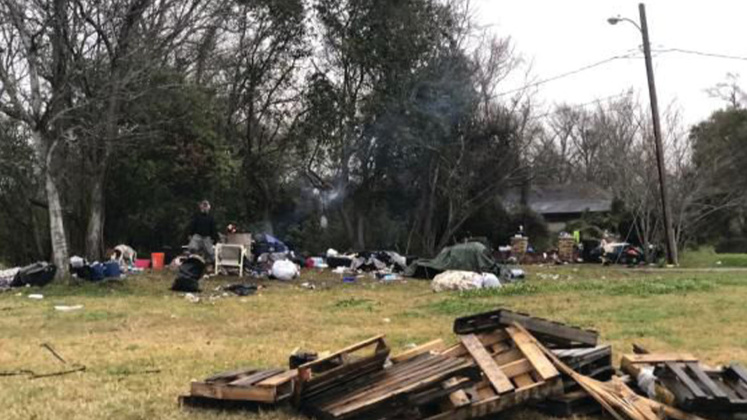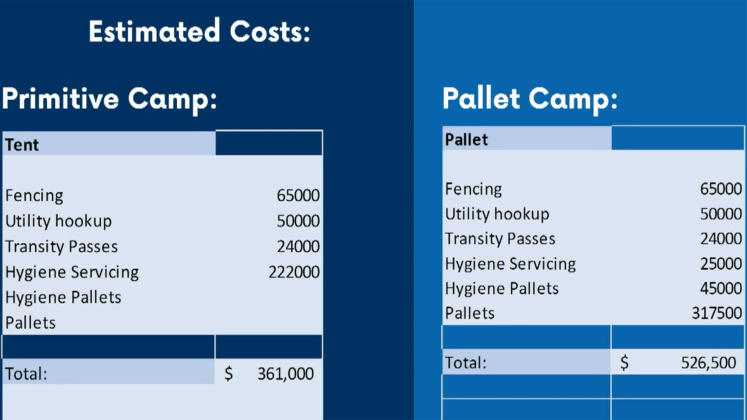During the Sept. 26 Beaumont City Council meeting, staff and elected officials held a work session to review and discuss the city’s Sanctioned Encampment Strategy to address the needs of the city’s homeless population.
Led by Assistant City Manager Chris Boone, staff presented a slideshow to city council displaying articles of reflection from other cities that had already established an encampment, types of encampments, and the budget required for each.
The first of the two encampment types mentioned was a primitive camp featuring tents, portable restrooms and showers, as well as additional tents for additional services.
“In terms of primitive camps, you have to have a site, hygiene stations, trash collection, security and transportation access within half a mile,” said Boone. “In reviewing the TDHCA (Texas Department of Housing and Community Development) guidelines for a HIC (Homeless Individual Camping), to date as late as last week, no cities or counties have an approved plan as of yet, and while you may hear of other camps operating in the state of Texas, those pre-dated the bill.”
The second option discussed was a pallet camp, which offers a more substantial structure than a tent, and what Boon described as tiny home villages which include AC, heat, lighting and beds. The concept includes hygiene units, security, installation of utilities and transportation access.
In comparing the cost of the two encampment styles, Boone presented an estimated cost comparison indicating $361,000 to establish a primitive camp and $526,500 to establish a pallet camp, excluding operational and security costs.
“The initial cost on a pallet camp would be higher, but I think you’d have less cost associated with the maintenance (of the pallet camp),” he added.
In terms of available funding, the council has authorized $250,000 within the general fund, the Community Development Block Grant program holds $417,000 that Boone indicated could possibly be reallocated, in addition to $100,000 earmarked for special projects budgeted and unused in previous years that could possibly be attributed to the encampment project – a total of $767,000. Boone indicated that the encampment strategy budget estimate included serving 25 to 50 individuals.
Boone described three options to the council including a Request for Proposal to nonprofits to establish and/or operate a camp or add capacity to an existing shelter; issuing a RFP for a nonprofit to simply operate the camp; or for the city to establish a camp and operate it with city staff and hope for help from local nonprofits.
“Looking at our resources, I wouldn’t recommend option three,” said Boone.
Steps included in the process have already begun, as funds were earmarked within the Fiscal Year 2024 budget. Councilmen Mike Getz responded to Boone’s proposal and, as the chair of the Mayor’s Homeless Coalition for the last four years, indicated that, while no nonprofits have expressed the desire to establish the campsite, several have indicated a desire to be part of its operation.
“What has to happen, sooner than later, is the city needs to identify some land, and the city has hundreds of acres of vacant land. We need to identify land that is fairly remote from residential neighborhoods and business corridors and, on that land, we need to do the things that you’ve listed on the checklist to be certified,” said Getz. “We need to act on this, and this is one of the things the coalition identified as a goal; and, after four years, it is well past time.”
Mayor Roy West spoke to the matter by indicating that the Salvation Army facility is usually at a 60% capacity, “but my understanding is the reason we are going through this process and looking at an alternate is so we can have this no camping ordinance, but we need TDHCA approval.”
“We need to include them from the very beginning because we can spend a lot of time only not to get their approval. I would hate for us to go through the entire process only to be rejected, and this isn’t something the city gets to do on its own,” West said.
Councilmember Turner stated his support for moving forward with identifying land and moving forward with establishing the encampment, as well as his preference for moving forward with options one and two with the nonprofit involvement.
Councilmember Randy Feldschau spoke of his support for moving forward, as well, joined in unison by Councilmember Chris Durio, who added that he expected a lot of pushback no matter where any encampment was located and that the location needed to be identified first: “No matter what part of the city it’s in, folks are not going to want it in their neighborhood.”
When Boone was asked when recommended locations could be available, he simply answered “Soon.”



